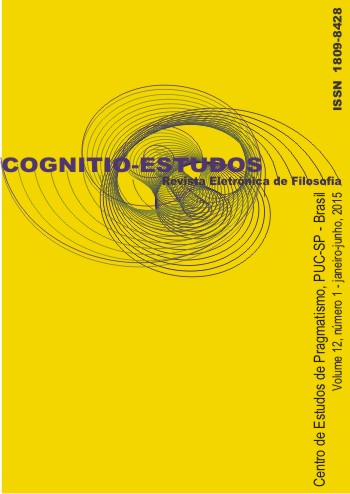A percepção em três registros: Russel, Peirce e Caeiro
Palavras-chave:
Percepção. Signo. Semiótica. Fenomenologia.Resumo
Este artigo foi escrito no âmbito de disciplina de pós-graduação, ministrada pelo professor Segolin, sobre Fernando Pessoa, na PUC-SP, e visa apresentar três pontos de vista com relação à “percepção”. Neste trabalho, partimos da monografia de Blikstein sobre o filme “O Enigma de Kaspar Hauser” para contrastar três visões distintas sobre o fenômeno da percepção. A percepção, embora classificada como “coisa extralinguística”, está conectada umbilicalmente com o próprio fenômeno linguístico, e o antecede: por detrás do signo, reside esse fenômeno cognitivo chamado percepção. Aqui discutiremos as diferenças das teorias de percepção em Bertand Russell, Charles Sanders Peirce e em Alberto Caeiro, heterônimo do poeta Fernando Pessoa. Na obra de Russell, a percepção possui uma posição de destaque, servindo de alicerce para sua teoria do conhecimento. No entanto, ao longo de sua obra, Russell modificou o tratamento que dava à percepção, não chegando a desenvolver uma teoria acabada. Já Peirce, embora tampouco tenha logrado conceber uma teoria sistemática da percepção, deixa claro que sua fenomenologia está calcada nela. Afirma explicitamente que a Primeiridade, Secundidade e, por conseguinte, toda forma lógica de pensamento, são dadas na percepção. Por sua vez, Alberto Caeiro alça a percepção a um status ainda mais elevado. Para ele, não só o conhecimento é mediado pela percepção como a própria busca por esse conhecimento é irrelevante e supérflua. Para ele, nada mais importa além da relação sensorial de sua consciência com os objetos externos.
Métricas
Referências
AGOSTINHO, Santo. De Doctrina Christiana, In: Le magistère chrétien. Paris: Desclée de Brouwer, 1949.
BARTHES, Roland. Elementos de semiologia. 70. reimp. Lisboa: Edições, 1973.
BERNSTEIN, Richard. Peirce’s Theory of Perception. In: (Eds.) MOORE, E.G. e ROBIN, R.S. Studies in the philosophy of Charles Sanders Peirce. Amherst: University of Massachusetts Press, 1964. v. 2.
BLIKSTEIN, Izidoro. Kasper Hauser ou a fabricação da realidade. São Paulo: Ed. Cultrix/EDUSP, 1983.
BONOMI, Andrea. Fenomenologia e estruturalismo. São Paulo: Ed. Perspectiva, 1974.
COSERIU, Eugene. Principios de semântica estructural. Madrid: Gredos, 1977.
GREIMAS, Algirdas J. Semântica estrutural. São Paulo: Cultrix/EDUSP, 1973.
KANT, Immanuel. Crítica da Razão Pura. In: Os pensadores. São Paulo: Ed. Nova Abril Cultural, 2005.
LAURENTIZ, Paulo. A Holarquia do pensamento artístico. São Paulo: Ed. Unicamp, 1991.
MACHADO, Roberto. Deleuze e a filosofia. Rio de Janeiro: Ed. Graal, 1990.
MERLEAU-PONTY, M. Signes. Paris: Éditions Gallimard, 1960
NIETZSCHE, Friedrich. Crepúsculo dos ídolos. São Paulo: L&PM Pocket, 2009.
PEIRCE, Charles S. Os pensadores. São Paulo: Editora Abril, 1983.
______. Semiótica. São Paulo: Ed. Perspectiva, 1990.
______. The collected papers of Charles Sanders Peirce. Eletronic edition. Disponível
em: <http://www.4shared.com/document/oRnzQCug/The_Collected_Papers_of_
Charle.html>. Acesso em: 29 maio 2011. [citado CP, seguido pelo número do volume
e número do parágrafo].
PESSOA, Fernando. Obra poética. 3. ed. Rio de Janeiro: Ed. Maria Aliete Galhoz, 1969.
______. Páginas íntimas e de auto-interpretação. (Ed.) por Georg Rudolf Lind e Jacinto do Prado Coelho, 2. ed. Lisboa: Edições Ática, 1966.
RUSSELL, Bertrand. The Problems of Philosophy. [S.l]: Allen & Unwin, 1961.
______. A análise do espírito. São Paulo: Ed. Cia. Nacional, 1962.
______. Meu desenvolvimento filosófico. Rio de Janeiro: Ed. Zahar, 1980.
______. Nosso conhecimento do mundo exterior. Rio de Janeiro: Ed. Zahar, 1966.
______. Misticismo e lógica. Rio de Janeiro: Ed. Zahar, 1962.
______. The analysis of matter. Rio de Janeiro: Ed. Zahar, 1967.
ROUANET, Sérgio P. A razão cativa - as ilusões da consciência: de Platão a Freud. São Paulo: Ed. Brasiliense, 1985.
SARTRE, Jean Paul. What is literature?. Londres: Ed. Frechtman, 1970.
SEGOLIN. Fernando. Fernando Pessoa: poesia, transgressão, utopia. São Paulo: Ed. PUC-SP, 1992.

